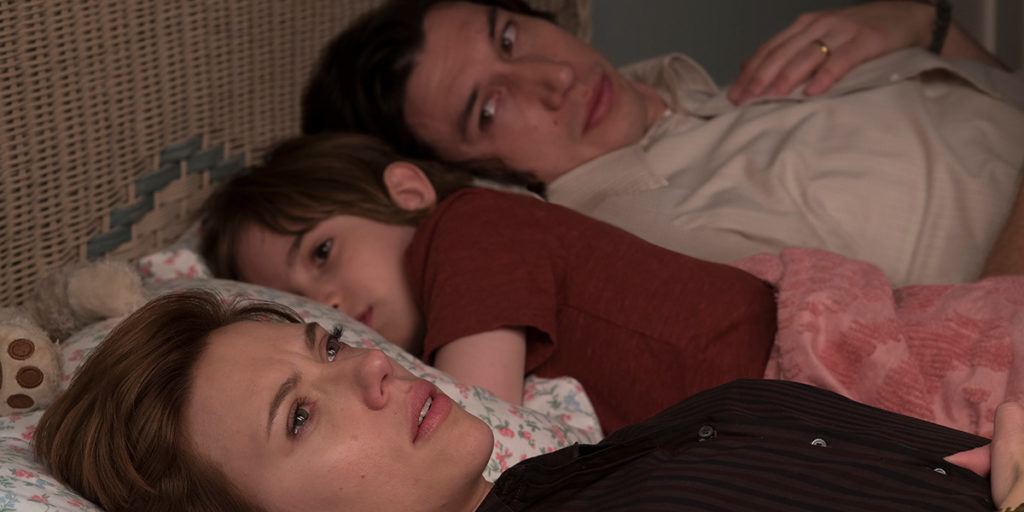Marriage Story

Scarlett Johansson, Adam Driver and Azhy Robertson in Noah Baumbach's MARRIAGE STORY. Image courtesy TIFF.
“The king and the queen went back to the Green, but you can never go back there again.”
This past week I celebrated twenty years together with my wife. I’ve ruminated on who people are, as they say in legal parlance, jointly and severally. When some of us grow apart, as inevitably happens, some of the scaffolding that we grew into gets ripped apart. This is where Noah Baumbach’s MARRIAGE STORY lives.
Nicole and Charlie are good people, with similar goals. But it’s complicated. They help as much as they hinder one another. Having agreed to a mediation process during their separation, they compare notes they’d written about each other at the beginning of their marriage. Having been cheated on, Nicole takes a different route, connecting with an attorney, Nora (Laura Dern), and serves papers too Charlie.
“You don’t want to be married,” says Nicole.
Charlie responds, “I don’t want this.”
“What did you think was going to happen.”
Nicole and Charlie are good people. But once lawyers get involved, including Ray Liotta as a $900-an-hour, high-powered divorce attorney, negotiations break down and character assassination ensues. Nicole’s mother, Sandra (Julie Hagerty), plays that intrusive in-law who wants to stay friends no matter how uncomfortable it makes you.
Living in New York, both working in the theatre—Charlie a director and Nicole and actor—they’re supported by the same circle of friends, including a theatre patron played by Wallace Shawn who seems to fashion himself a poor man’s Truman Capote. Friends can be great soundboards, but they can also turn into sycophants offering guidance is biased by a their need to be part of your social circle—. Sometimes, you’ve got to to kick out the friends and lawyers and have a heart to heart with each other.
They do, and it’s the most poignant scene in a film I’ve watched this year at TIFF. In the most heated of Nicole and Charlie’s clashes, words become like knives. But sometimes, the catharsis is a necessary step in our self-awareness and growth. Here, Johansson and Driver deliver their most powerful performances yet. A couple that doesn’t ever argue doesn’t communicate enough.
In films, we’re too often treated to the version of divorce that ends with both parties hating each other. But that’s not generally how couples grow apart. Most of the divorced couples I know love each other because they’ve invested so much in each other, evolved together as adults, and function well as parents with joint custody, but have different needs and goals.
“I realized I didn’t ever really come alive for myself,” Nicole confides in Nora. The more success came to Charlie, the more impatient he became.
In negotiations between Nora and Charlie’s first lawyer (Alan Alda)—an affordable, retired civil lawyer—Baumbach uses the clever device of ordering lunch to contrast the divorce proceedings now run by attorneys with Charlie and Nicole’s locus of control and how they exercise it. After watching Charlie waffle indecisively, she orders him a salad. Yet tens of thousands of dollars spent, their child’s college tuition exhausted, the gears of divorce are unstoppable.
So it goes. Some people continue to be a social unit, good friends, great parents, even if they can’t live with one another.